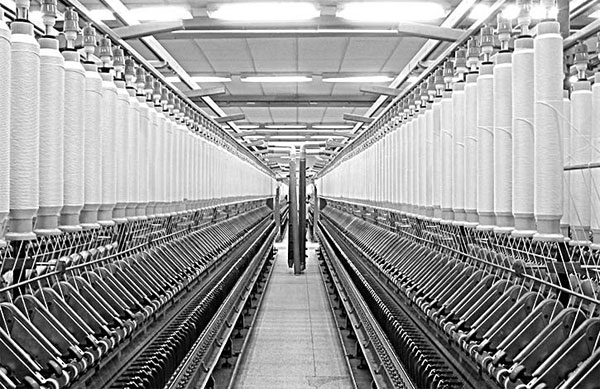Textile industry at the crossroads of change
Updated: 2015-01-05 13:32
By Wang Chao and Liu Lu(China Daily USA)
|
||||||||
Relocation to Africa, in terms of costs and market access is proving attractive for companies
With the average wage of the 23 million textile workers in China reaching $600 a month, garment factory owners are starting to greet each other with a variation of: "Have you moved the factory out of China yet?"
As a labor-intensive industry, garment-making faces great pressure as labor costs soar in China.
|
Workers in a textile factory in Guilin, Guangxi Zhuang autonomous region. China's textiles industry has slowed significantly since 2011. Wang Chao / China Daily |
|
Many Chinese garment-makers have moved their factories to destinations such as Southeast Asia due to rising labor costs. Wang Chao / China Daily |
Wang Tiankai, director of the China National Textile and Apparel Council, says the minimum wage is growing 10 percent a year. "And by only offering the minimum wage, you can never recruit a skilled worker," Wang says.
Labor costs are not the only challenge: Figures from the council show the momentum of China's textile industry has slowed significantly since 2011. From 2000 to 2010, average growth was 18.8 percent, but that dropped to 12 percent over the past four years.
The price of high-quality cotton in China is about 30 percent higher than the international level, which caused fiber processing in China to drop by 26 percent last year, the council says.
Major garment makers are reacting differently to these challenges. Two main paths have emerged: moving to Africa or Southeast Asia for the low-cost labor, or staying in China to make premium products.
Yuemei Group belongs to the first group. Established in Zhuji, Zhejiang province, in 1992, Yuemei has a presence in seven African countries including Nigeria, Ghana and Tanzania, and has hired 2,600 African workers.
Xu Zhiming, chairman of Yuemei Group, now operates 40 percent of his business in Africa and the rest in China. He says the situation will be reversed in three to five years. The company's current annual output in Africa is worth $30 million.
"Africa will definitely be the manufacturing center of the world in the future," Xu says.
This year the company bought a cotton plantation in Mali that will soon supply raw material for its cloth-making operations in Africa. Once the mill reaches full capacity, it will cut the cost of raw materials by 50 percent, Xu says.
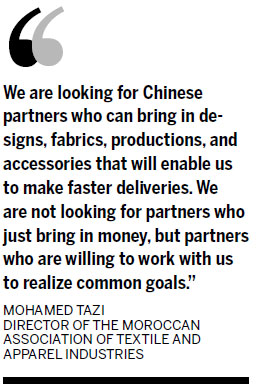
Chinese textile companies' investments are welcome in African countries. Morocco, for one, is avidly seeking Chinese capital and know-how.
Under Morocco's 2009 industrial development plan, it would attract foreign investment to help develop six major industries, and textile is high on the agenda.
The Moroccan Investment Development Agency says most garments made in Morocco are exported to Europe or the United States and bring in revenue of about 4 billion euros ($4.95 billion) every year. Most of the products are fast-fashion or ready-to-wear garments. The agency is a government body that helps attract foreign investment to Morocco. Fast fashions are those that move from the catwalk to retailers quickly to capture the latest trends.
Mohamed Tazi, director of the Moroccan Association of Textile and Apparel Industries, says Chinese garment producers can look to gain better access to European, African and other markets if they set up factories in Morocco. They can take advantage of the country's strategic position at the crossroads of the main trade routes linking Africa and Europe, as well as its free trade agreements with the United States, the EU, Turkey, Jordan, Tunisia and West Africa.
"Morocco is an ideal platform for Chinese clothing and textile producers to access markets with more than 1 billion consumers," says Tazi, adding that the textile industry contributes more than 13 percent of Morocco's GDP.
Chinese entrepreneurs would also help Morocco complete the local supply chain, Tazi says.
"We are looking for Chinese partners who can bring in designs, fabrics, production, and accessories that will enable us to make faster deliveries. We are not looking for partners who just bring in money, but partners who are willing to work with us to realize common goals.
"The opportunities here are tremendous. Companies can even make money by just providing training services for garment manufacturing." Some garment companies from Hong Kong have already moved their factories to Morocco, he says.
Somitex Morocco, which supplies fast-fashion clothes to UK retailers such as Marks & Spencer, Sainsbury's and Monsoon, is the biggest garment manufacturing company in Sale, a city in northwestern Morocco. It wants to work with a Chinese company to produce more accessories and expand its capacity.
"We have to import lace from the Middle East and Asia since the same is not produced locally. The long time it takes to ship the goods from China has led to delayed shipments from our side," says Abdelhai Bessa, chairman of Somitex.
"If Chinese companies can set up fabrics and accessories factories in Morocco, it will be easier for us to procure the required products locally. It gives us more flexibility and enables us to be more responsive to consumer demand."
Bessa says labor costs are almost the same in Morocco as in China, so it makes sense for companies to work together.
But some industry leaders do not think China's textile industry has approached its sunset, and instead of retreating from China, have planned major expansion.
Esquel Group, a Hong Kong-based garment-maker, plans to invest 2 billion yuan ($325 million) to build a new factory in Guilin, Guangxi Zhuang autonomous region.
Established in 1978, Esquel is a textile conglomerate running a complete value chain - cotton growing, spinning, weaving, dyeing, sewing, and retailing. It is the largest cotton shirt maker in the world in terms of output.
Last year it made more than 100 million shirts for different brands across the world, with total turnover of $1.3 billion. Every second, eight shirts can be produced in an Esquel factory.
John Cheh, vice-chairman and CEO of Esquel, says it is not necessarily a bad thing that wages keep rising in China. "Rising wage means improved skills, higher efficiency and improved consumption power among Chinese people.
"Labor costs in cheap areas will eventually rise, then we will lose competitiveness eventually; so moving is not a wise solution."
Esquel has factories in Mauritius, Malaysia, Sri Lanka and Vietnam, but it has no intention of moving manufacturing out of China.
Aaron Lee, chief operating officer of Esquel, compares the textile industry in China to the car industry in Europe decades ago.
"By then, everybody was talking about the car industry leaving Europe, as the cost was so high and the competition from Japan and South Korea was so fierce; but now it is still thriving in Europe. That tells us: It is not the cost but the margin that really matters.
"We are thinking more of optimizing the process and adding value than of chasing after cheap labor," Lee says.
Esquel makes only high-end shirts for international brands such as Zara, Ralph Lauren, Tommy Hilfiger, Nike and Muji, as well as some high-end domestic brands in China, so the margin is higher than in making simple T-shirts.
Marks & Spencer is among these major customers. Every year it buys more than $60 million in products from Esquel. Frazer Mead, head of innovation and quality, Far East region, of Marks & Spencer, says China is getting more expensive for making garments, but their business in China would stay relatively stable.
"China represents 60 percent of garments that M&S buys in Asia, and about 40 to 50 percent of the total in the world. In terms of fabric, China represents about 60 to 70 percent of the fabric we use across the world."
Chinese workers' skills and efficiency are so high that they are hard to replace, he says.
"My job is to assess countries' suitability for certain kinds of products. Simple products such as T-shirts, basic trousers and nightwear can be migrated more easily to lower-cost countries; but lower-cost countries generally mean lower skill levels. You have to be careful when you move to Bangladesh or Vietnam so you don't bring products to them for which they have yet to develop the skills.
"China is a world leader in terms of raw materials such as fabric, especially linen, cashmere and silk. And the innovation is getting better, driven by the competition from South Korea."
Over the years, China has also changed from a manufacturer of cheap garments to a major market for international brands, so being in the country also means being close to the most dynamic market.
Ten years ago, almost all garments made by Esquel were exported to Western countries, but now the ratio of products exported to the United States has dropped from 70 percent to 40 percent, says Cheh. "Domestic clients account for more than 12 percent, from zero 10 years ago. Some are domestic brands, some are foreign brands buying directly in China and selling them in the Chinese market under their brands."
The ever-changing taste of Chinese consumers means brands have to keep innovating by creating new designs and new functions, which raises new requirements for garment manufacturers.
Lee of Esquel says that every season, the company calls a meeting to talk about the new research and development and new designs, so its clients can come and decide which new elements and new functions they want to incorporate into the products.
"We are not just selling them shirts. We have a lot of interactions with our clients. We do our part, such as R&D, design and merchandising to be supportive," Lee says.
Mead says with the burgeoning middle class and well-defined education system in China, not everybody wants to wear garments with a big logo. "People are looking for fashionable, but also something that would last more than one wash," he says.
Building a high-end brand is another way to raise the margin, experts say, but so far no Chinese company has succeeded in building an internationally renowned brand. Even Esquel is still at the very early stage of building its own premium shirt brand, and the premium brand Pye contributes only a fraction of Esquel's total revenues.
Wang of the textile council suggests companies innovate more with new materials so they are able to come up with more functional materials. "So they can be less dependent on cotton," he says.
"Textiles is the only industry in which China has a strong advantage in the world, and we have good reasons to keep it alive," Wang says.
Contact the writers through wangchao@chinadaily.com.cn
(China Daily USA 01/05/2015 page16)
- Chinese supermarkets help Brazil, Argentina ride out tough holiday season
- Blog bridge Brazil-China economy
- Chinese VP attends Brazilian president's 2nd-term inaugural
- Brazil uses antidumping measures against China
- Thousands gather in NYC to see off slain policeman
- Weather believed 'triggering factor' in AirAsia crash

 Thousands gather in NYC for funeral for slain police officer
Thousands gather in NYC for funeral for slain police officer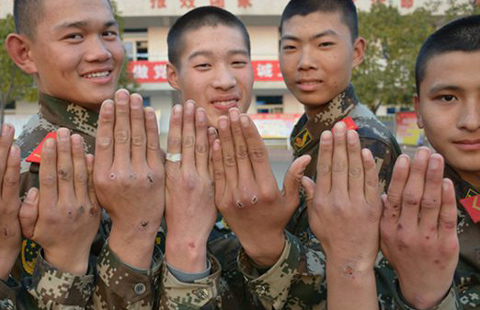
 Scars of honour
Scars of honour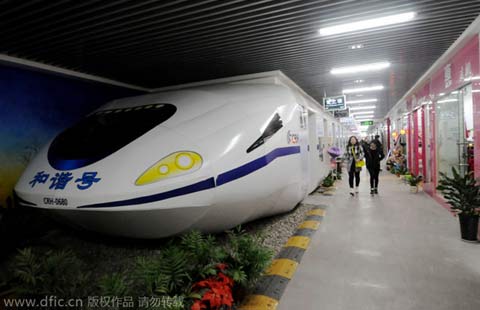
 Mall turns shops into rail carriages
Mall turns shops into rail carriages
 Martial arts conference to be held in Georgia
Martial arts conference to be held in Georgia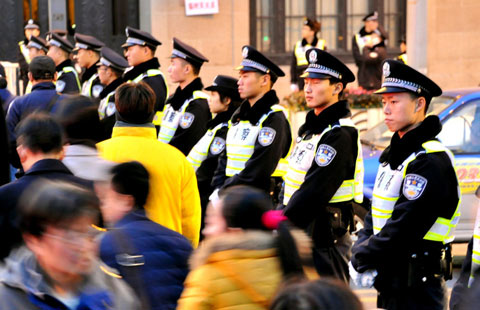
 Shanghai beefs up security around fatal stampede site
Shanghai beefs up security around fatal stampede site
 Slain NYPD officer's wake ceremony held in Brooklyn
Slain NYPD officer's wake ceremony held in Brooklyn
 TV drama hides assets of actresses
TV drama hides assets of actresses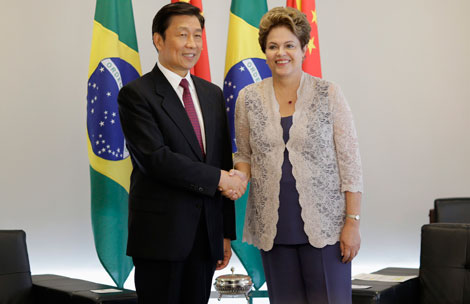
 Chinese VP attends Brazilian president's 2nd-term inaugural
Chinese VP attends Brazilian president's 2nd-term inaugural
Most Viewed
Editor's Picks
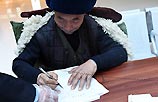
|

|

|
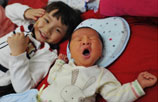
|
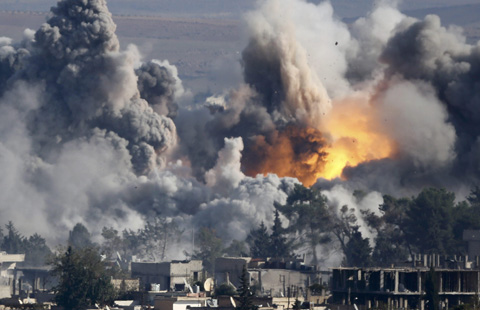
|

|
Today's Top News
China braces for slower but better growth in 2015
New York mourns slain police officer
Chinese VP attends Brazilian president's 2nd-term inaugural
Brazil uses antidumping measures against China
Thousands gather in NYC to see off slain policeman
China's former IOC member He Zhenliang dies
NYC mourns slain NYPD officer
Chinese to unveil SUV at Detroit show
US Weekly

|

|

